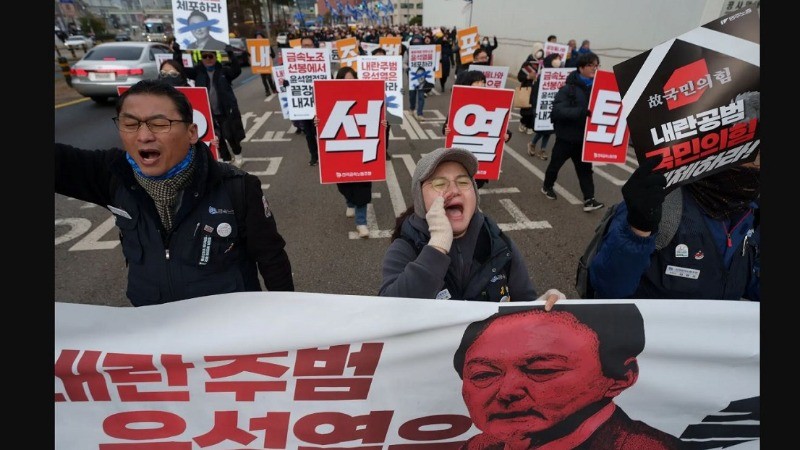
South Korean President Yoon Suk Yeol is facing a second impeachment vote in parliament, with mounting pressure from opposition parties and public protests. The political crisis stems from his controversial and short-lived declaration of martial law, which has fueled calls for his removal from office.
Opposition Pushes for Impeachment
Opposition lawmakers have accused President Yoon of insurrection, citing his unprecedented decision to deploy military forces to the legislature. This move, which marked the first attempt to impose military rule in South Korea in 45 years, lasted only six hours before being rescinded. The incident sparked nationwide outrage and plunged the country into political instability.
Last Saturday, an impeachment attempt fell short when members of Yoon’s governing People Power Party boycotted the vote, arguing that he should be given an opportunity to resign voluntarily. Only three of the party’s 108 lawmakers participated, leaving the opposition eight votes short of the required threshold.
However, support for impeachment within Yoon’s party has since grown. As of Thursday, seven ruling party lawmakers have indicated their willingness to back the impeachment motion, heightening uncertainty for the president.
Martial Law Sparks Legal and Public Backlash
The impeachment bill asserts that Yoon’s martial law declaration violated the Constitution, which permits such measures only in cases of war, armed conflict, or national emergencies. The bill also alleges that Yoon committed insurrection by deploying special forces to block lawmakers from overturning his order.
On the night of the martial law declaration, chaos erupted as military troops stormed the legislature. Parliamentary aides and citizens resisted by using fire extinguishers and constructing barricades. Their actions enabled lawmakers to convene and strike down the martial law order, forcing Yoon to withdraw it.
Insurrection, a grave offense under South Korean law, carries a maximum penalty of death or life imprisonment for ringleaders. The president is now under investigation, with authorities barring him from leaving the country. Several high-ranking officials, including his former defense minister and police chiefs, have already been arrested on related charges.
Public Outcry and Declining Support
President Yoon’s popularity has plummeted to a record-low approval rating of 11%, according to a Gallup Korea poll released Friday. The poll also revealed that 75% of respondents support impeachment, while 71% believe the president is guilty of insurrection.
A large crowd of demonstrators converged outside the National Assembly on Saturday, vocally urging lawmakers to remove President Yoon from office. Holding signs that read, “Impeach Yoon Suk Yeol, the Ringleader of Insurrection,” they called on lawmakers to act decisively.
Next Steps and Constitutional Implications
If the impeachment motion passes, President Yoon will be suspended from office while the Constitutional Court reviews the case, a process that could take up to six months. During this period, Prime Minister Han Duck-soo, who holds limited political authority, would serve as interim leader.
The opposition has pledged to continue weekly impeachment votes until Yoon is ousted. Meanwhile, the political and social turmoil shows no signs of abating.
Opposition leader Lee Jae-myung urged lawmakers to prioritize the nation’s welfare over party loyalty. “What you should defend is not Yoon Suk Yeol, not your own party, but the livelihoods of people who are out on the cold streets crying for his impeachment,” he said.
As South Korea braces for the outcome of the impeachment vote, the nation remains deeply divided, with its political future hanging in the balance.